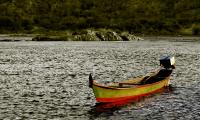Addressing human rights of indigenous peoples in SDG 14 and the blue economy

Photo by: Vladimir Soares on Unsplash.com
The right to lands, territories and natural resources is essential for the millions of indigenous people across the globe depending on fisheries for their livelihoods, food security and nutrition. In many parts of the world, indigenous peoples’ rights in the context of coastal and marine ecosystems are not adequately recognised, protected and enforced. In fisheries and aquaculture sectors, indigenous peoples are often discriminated against and excluded from decision-making processes. This leads to risks that their rights are ignored or undermined by blue economy or conservation initiatives, such as the establishment of marine protected areas and market-based distribution of fishing quotas.
Implementation of Sustainable Development Goal 14 Life Below and strategies for strengthening the blue economy must be aligned with human rights standards and take adequate considerations towards population groups dependent on coastal ecosystems and marine resources. Any action designed and implemented to achieve Goal 14, should be human rights-based and be guided by the UNDRIP and other relevant human rights instruments, to the extent that it may affect indigenous peoples.
2022 is a big international year for deliberations on sustainable oceans with the UN Oceans Conference in June, the review of Sustainable Development Goal 14 at the High-level Political Forum in July, and with the decision by the UN General Assembly to declare 2022 the International Year of Artisanal Fisheries and Aquaculture (IYAFA 2022). Human rights of indigenous peoples and local communities engaged in fisheries and aquaculture will also be affected by the negotiations of the Post-2020 Global Biodiversity Framework and the development of a new international legally binding instrument on the conservation and sustainable use of marine biological diversity of areas beyond national jurisdiction (BBNJ) which continues in 2022.
The objective of the side event is to draw attention to the human rights issues faced by indigenous peoples engaged in fisheries and aquaculture in the context of the UNPFII’s discussions on the 2030 Agenda for Sustainable Development. The event will provide an opportunity for joint reflection on activities the UNPFII can consider for increasing the attention rights of indigenous peoples engaged in fisheries and aquaculture in the implementation of the 2030 Agenda.
The side event is organised by IWGIA and the Danish Institute for Human Rights, co-sponsored by the Indigenous Peoples’ Major Group for Sustainable Development (IPMG) and supported by the Food and Agriculture Organization of the United Nations (FAO).
Link to the webinar
The webinar will take place on Zoom via this link https://bit.ly/3jhWBvK
The event will be in English and Spanish with interpretation. The recording of the event will be publicly available.
